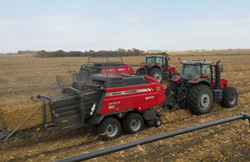 The largest and most experienced biomass harvest company in the country wants to help ethanol plants develop or expand operations into the production of cellulosic ethanol by saving time and money on supply chain development. PacificAg, which is already supplying biomass for plants in Iowa and Kansas, enables cellulosic biorefineries the ability to source cost-competitive biomass for biofuel and biochemical production.
The largest and most experienced biomass harvest company in the country wants to help ethanol plants develop or expand operations into the production of cellulosic ethanol by saving time and money on supply chain development. PacificAg, which is already supplying biomass for plants in Iowa and Kansas, enables cellulosic biorefineries the ability to source cost-competitive biomass for biofuel and biochemical production.
PacificAg started in the residue management business nearly 20 years ago harvesting forage crops for feed in Oregon and CEO Bill Levy says they have expanded to meet the needs of the growing biofuels industry in the Midwest.
 “We can save an ethanol plant the time and money in developing a supply chain,” says Levy. “It’s a very specific supply chain with very specific challenges and I think we have a lot of experience overcoming these challenges and developing these supply chains quicker than anybody else.”
“We can save an ethanol plant the time and money in developing a supply chain,” says Levy. “It’s a very specific supply chain with very specific challenges and I think we have a lot of experience overcoming these challenges and developing these supply chains quicker than anybody else.”
Biomass products include corn stover, wheat straw and milo stover products because of their abundance and supply. “What we’ve found in the Midwest is that not all growers are accustomed to removing this supply,” says Levy, stressing that a major component of their suite of services includes a balanced residue management program.
There are two critical elements an ethanol plant must consider when ramping up cellulosic ethanol production: year round biomass supply and sustainability around biomass residue harvest.
Harrison Pettit, a company partner who works with ethanol plants to help them get their biomass programs off the ground, notes that market needs for advanced biofuels industry are long-term and year round. “Ethanol plants are built to operate for more than 30 years.”
How does a grower know if he or she should participate in a biomass residue harvest program? Pettit says the first question to ask is, Are you within 100 miles of a cellulosic ethanol facility? “If you are a corn grower, wheat grower or milo grower, then you really ought to give us a call,” says Pettit. “If you really want to learn about how a residue management program can benefit your ground and benefit your bank account, then we want to talk.”
Learn more about PacificAg and the services they offer for both farmers and ethanol plants in these interviews with Levy and Pettit.
Interview with PacificAg CEO Bill Levy
Interview with PacificAg partner Harrison Pettit

